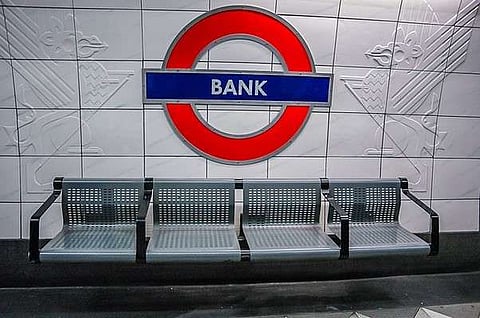

[vc_row][vc_column][vc_column_text]
If you've ever wondered what makes the UK banking system tick, then you're in the right place! From understanding the pivotal role of regulatory bodies to demystifying how interest rates are controlled, recognizing differences between commercial and investment banks, to decoding the purpose of sort codes; it's all part of this fascinating financial machine.
Add into that mix an understanding of why cash still has significance, how banks magically create more money through credit creation, and an appreciation for variety in the UK's banking players – it's a lot to unravel.
So let's journey together into the heart of the UK's banking system!
The Financial Conduct Authority (FCA) and Prudential Regulation Authority (PRA) are the referees of the UK banking system. They set rules and guidelines for banks to follow, ensuring fairness for customers and stability in the market.
The FCA focuses on conduct regulation – essentially making sure banks play fair with their customers. On the other hand, PRA oversees prudential matters – checking that banks have enough capital to stay in business without causing financial upset if things go wrong.
Simply put, they are the watchdogs ensuring our banking experience is safe and reliable.
The Bank of England is kind of like the banking system's control center. It sets the monetary policy that all other banks follow, particularly interest rates. Lowering or raising interest rates can stimulate or slow down economic activity.
Thus, it's no exaggeration to say that the Bank of England wields great power! Striking the perfect balance in its decisions is crucial for it. It needs to prevent inflation from skyrocketing but simultaneously encourage economic progress.
It's indeed a fine line to tread! With such a central role, each move it makes sends ripples through every other element of the UK's financial infrastructure. It's a critical piece in our banking puzzle.
Picture sort codes like the postal codes of the banking world. These are uniquely crafted six-digit numbers used everywhere when making a transfer or setting up a payment in the UK. Each bank and branch has its own unique sort code, kind of like an address for your money!
You're using sort codes any time you're sending money or setting up direct debits. These sort codes form an essential part of routing our transactions accurately.
Even though they may appear as mere numbers, these crucial codes serve a considerable role in the successful execution of our everyday banking operations. They ensure that every transaction reaches its intended destination correctly and promptly.
Commercial banks are those you're likely most familiar with. They're your go-to for everyday banking needs – be it depositing paychecks, withdrawing cash, or applying for a personal loan. On the other hand, investment banks operate in the big leagues.
They're all about dealing with business clients, offering services like mergers and acquisitions help or stock issuing guidance.
So while their target markets differ widely, both types of banks play vital roles in maintaining a healthy economy and helping customers meet their financial goals.
Onto the sheer variety of banks in the UK – over 300! Each one of these banks has its own unique focus and audience. Some might cater to students, others to businesses or retirees.
Thanks to this variety, there's a perfect fit for almost every financial need. So when you're looking for a bank, whether it's to save some cash or secure a mortgage, consider this wide-ranging line-up.
You'll likely find the perfect fit – an institution that understands and meets your requirements well within this impressive mosaic of British banking!
Despite the rapid advance of digital money into our everyday lives, cash has not lost its place in the UK's banking system. A substantial number of businesses and individuals continue to turn to tangible currency for their day-to-day monetary dealings, notwithstanding the growing popularity of online banking.
Banks continue to manage large quantities of cash every day, supplying ATMs and processing deposits and withdrawals. So despite advancements in technology, traditional banking methods persist and still play a pivotal role.
In short, don't discount those grubby notes just yet – cash continues to play an intrinsic part within the UK's diverse banking system.
Let's get into one of the most fascinating facets of banking – credit creation. Have you ever wondered how banks bolster the economy? Well, when a bank gives you a loan, it essentially creates new money.
While they can't print more cash, banks have this unique ability to add wealth to the economy using digits on a screen.
When they extend credit – be that for a personal loan, mortgage, or business lending – it increases the total sum of money in circulation. And while it might sound like some form of wizardry, it's just good old banking genius at work!
Now that you've been introduced to the inner workings of the UK banking system, why not delve deeper? There's a whole world of financial intrigue waiting for exploration, so get out there and continue expanding your understanding of this key industry!
[/vc_column_text][/vc_column][/vc_row]
Join our WhatsApp Channel to get the latest news, exclusives and videos on WhatsApp
_____________
Disclaimer: Analytics Insight does not provide financial advice or guidance on cryptocurrencies and stocks. Also note that the cryptocurrencies mentioned/listed on the website could potentially be scams, i.e. designed to induce you to invest financial resources that may be lost forever and not be recoverable once investments are made. This article is provided for informational purposes and does not constitute investment advice. You are responsible for conducting your own research (DYOR) before making any investments. Read more about the financial risks involved here.
